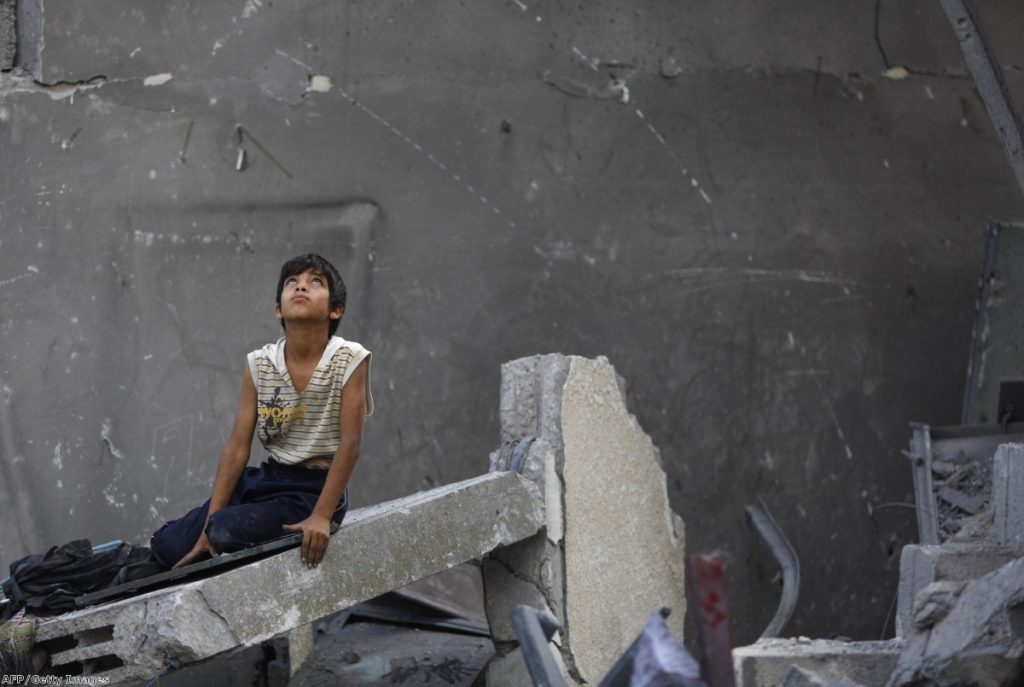How Britain profits from the attack on Gaza
The video emerged on Monday. It appears to show a man searching for his family amid the rubble of Gaza, apparently during a ceasefire. He is shot by a sniper. For a while he lies there, moving awkwardly. Then he is shot again.
The component parts of the sniper rifle may have been made in the UK. After Israel's 2009 incursion into Gaza – Operation Cast Lead – the Commons committee on strategic export controls found British arms exports "almost certainly" were used in the attack, in direct contravention of the UK's policy that arms exports should not be used in the occupied territories.
The military equipment sold to Israel includes parts for sniper rifles and small-arms ammunition, ground-based radar, military aircraft engines and navigation equipment, military communications and unmanned drones. Britain also supplied components for cockpit displays in US F-16 combat aircraft sold to Israel, engine assemblies for their US Apache helicopters, armoured personnel carriers and components for the guns and radar in Israeli Sa'ar-class corvettes.



Then-foreign secretary David Miliband told the Commons all future arms-related applications would be assessed "taking into account the recent conflict". After all, it is against Department for Business rules for an export licence to be granted where there is a clear risk they might be used to "provoke or prolong conflict within a country" or "be used aggressively against another country". Either criteria, depending on how you choose to look at it, could be applied to the Gaza crisis.
Britain even revoked a handful of licenses, all related to parts for an Israeli navy gunboat known as the Saar 4.5 Class Corvette, which was likely used to shell Gaza.
'Israel and the Palestinian territories' is the biggest recipient of approved export licences from the Foreign Office's list of 27 countries of human rights concerns. They are worth £7.8 billion to the UK, towering over China's £1.5 billion or Saudi Arabia's £1.8 billion. Of that £7.8 billion, just £5,539 goes to the Occupied Territories.
The number seems massive, especially given Britain is responsible for just one per cent of Israel's military imports (most come from the US). The vast majority of the figure is irrelevant. It's made up of a single licence approval for "equipment employing cryptography and software for equipment employing cryptography" – phone masts, basically. Put that to one side and you have what experts believe to be about £10 million in military contracts.

Here is what the money goes on, according to the Commons committee:
"All-wheel drive vehicles with ballistic protection; body armour, components for body armour, military helmets, components for pistols, components for body armour, components for all-wheel drive vehicles with ballistic protection, components for assault rifles, components for pistols, components for equipment employing cryptography, components for military communications equipment, cryptographic software, equipment employing cryptography, software for equipment employing cryptography, software for the use of equipment employing cryptography, general military vehicle components, military support vehicles, small arms ammunition, weapon sights, military communications equipment and components for small arms ammunition."
But Britain's military relationship with Israel is not one-sided. It is based on cooperation, on British firms working with Israeli firms, in an entanglement which precludes a critical political response to the savage attack on Gaza.
Take the Watchkeeper combat drone, built in the UK by UAV Tactical Systems, which was set up by Israeli company Elbit Systems and French company Thales. Elbit's 51% stake tells you where the balance of power is. UAV Engines, which builds the rotary engine, is a wholly-owned subsidiary of Elbit.
In 2007, the Ministry of Defence ordered 54 Watchkeepers at a cost of £800 million. They came in late, of course, but the Watchkeeper system will be in service until 2040.
That sort of contract is typical. At the Farnborough International Air Show, which ended a couple of days ago, Elbit was marketing its wares as 'battle tested'.

Israeli company Rafael and the Israeli Aerospace Industries (IAI) were also present. Rafael announced it was in negotiations to add to its 15-year deal with the Ministry of Defence so it could supply its fighter jets with new targeting pod systems.
Several British firms provide Israel with spare parts for the F16 and Apache fighter jets and naval ships. These were the machines used to kill hundreds of civilians in Lebanon. Human rights groups estimate that they have killed 223 Palestinians during the current offensive in Gaza, 46 of them children, 26 of them women and 14 of them elderly.
Yesterday, David Cameron urged a "proportionate" response from the Israelis, but he placed the blame overwhelmingly on Hamas. As a father his heart bled when he saw images of children being killed on beaches with Israeli munitions, he said. But "this can be most quickly brought to an end" by Hamas ceasing to fire rockets.
There were gasps in the Commons from the Labour benches. "These attacks are not just disproportionate," Peter Hain said. "In any other conflict they'd be described as war crimes."
That is precisely what they are, as any reasoned, impartial observer would conclude. But even if Cameron were such an observer he would be hamstrung by a military-industrial network which entangles British and American firms and state military departments in decades-long, multi-million pound contracts.
These military deals do not exist in isolation. They discourage any attempt by the British government to condemn Israel's operation with the sort of language which it deserves. Britain profits from Israel's horrible little wars. And Israel can conduct its horrible little wars because Britain's desire for profit trumps its commitment to human rights.

